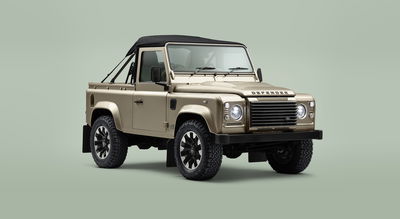How Do Drum Brakes Actually Work, And Why Aren't They As Good As Discs?

Most of us probably know how brake discs function. After pressing the brake pedal, a master cylinder sends brake fluid down lines to the calipers, where one or more pistons will press one or two pads into a disc. The joys of friction then slow your car down, ensuring you don’t end up smashing into the car in front or bouncing off into the undergrowth at the first corner you see. Simple and effective.
But how about brake drums? The operation of these humbler pieces of braking technology is arguably something less well known, not helped by the fact that their use has declined over the years, relegated to being installed on cheaper cars with piddly engines.

The process starts off much the same, with fluid making its way down to the brakes from a master cylinder. Instead of entering a caliper, however, the brake fluid goes into a device called the wheel cylinder, located inside the cast iron brake drum itself. The fluid pushes two pistons within the wheel cylinder body outwards, forcing the brake shoes into the inner lining of the brake drum. Since the drum is attached to the hub, the friction generated then slows down the rotation of the wheel.
A spring sitting in-between the two pistons and another between the shoes ensures everything returns to its original position once the brake pedal is released. A threaded adjuster meanwhile will gradually unwind as the shoes wear, meaning the distance the shoes require to meet the drum surface does not increase over time.

Since the contact patch runs around the entire circumference of the drum, the braking force offered by a drum brake is greater than that of a disc brake of the same size. Using drum brakes, therefore, saves weight, and it saves manufacturers money, as they’re cheaper to produce. There’s a reason why - as noted earlier - they tend to be used on cars at the less expensive end of the spectrum. Finally, a set of brake shoes will generally last much longer than a set of brake pads.
They are more complex, though, which means maintenance takes up more time. Drums aren’t so good when it comes to heat management either - with all the components enclosed within the drum at the backing plate, any heat built up will have nowhere to go. An increase in heat means a reduction in friction, making the brakes less effective. Drum brakes are also much more susceptible to grab - where the shoes ‘stick’ to the drum even after the pedal is released - than disc brake systems.
It’s not hard, then, to see why brake discs have become the defacto choice for car manufacturers, and why you don’t see performance cars running drums anymore. But the humble drum brake still has its uses for slower, cheaper cars and commercial vehicles, so it’s unlikely to be going anywhere any time soon.















Comments
I’ve worked on them at college on my motor vehicle course and I f*cking hate them with a passion. They’re so annoying to dis and reassemble it’s a joke, I also almost lost my eye from one when a piece shot out.
You almost became the most kickass pirate mechanic
Drum brakes are awesome, if you like accidently launching tiny springs into the unknown.
Or eye
Or breaking the rusted springs in half while trying to remove them
A lot of manufacturers prefer using them on the rear as they’re more effective for the park brake than disc brakes
Most of them do it because drum brakes are cheaper to build
Mine are actually trash as a parking brake, my car will still roll occasionally.
HANBRAKE TURNS TO IMPRESS CHICKS, BUT CRASHES INTO CAR IN FRONT
DAMN YOU DISC BRAKES!
Another positive thing about drum brakes is that you don’t need a separate drum for the handbrake in the disc or calipers with a built in handbrake mechanism. It makes things very simple. From a maintenance point drum brakes are more care free since they are well protected from outside factors unlike disc brakes. And there are less problems with handbrake mechanisms getting stuck like with rear discs with a separate handbrake drum since the brake shoes always move. I think most lighter everyday cars should have discs at the front and drums at the rear for simplicitys sake.
You don’t need a separate drum, many cars have the rear calipers as handbrakes
I love drum brakes, my car only takes two football fields to stop now that I’ve rebuilt them.
Proudly thrown on the back axle of the 19k up! GTI, because performance.
They’re on the back of my Micra too, because slightly less performance.
I just learned about drums in my auto class. They are a hassle.
Drums also offer a lot more power because they can be setup as self-servoing - to the point where you can generate so much more brake force than a similar sized discs that you don’t actually need the vacuum servo any more.
How come big trucks don’t have disc brakes then hmmmmmm?